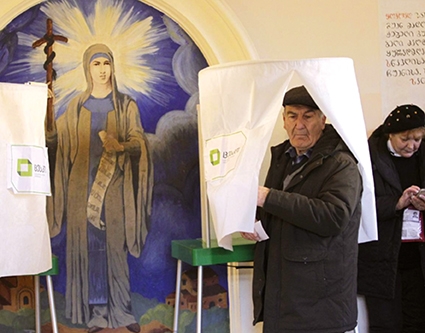The Power of Democracy is Proven
Op-Ed
The 2018 presidential elections have passed and are now part of Georgia’s history. The 5th President of Georgia, the governmental candidate Salome Zurabishvili, beat her opponent Grigol Vashadze from the oppositional party by 20%, thus becoming the last publicly elected president of the country. This is how the two million voters that went out to the ballot boxes on November 28, paid farewell to their right to elect the President of Georgia. According to the new constitution, from now on, the President of Georgia will be elected by MPs rather than the public, hence it is especially interesting how this election was different from the previous four and what novelty brought it into the history of Georgian elections.
The fact that “elections” is still quite an elusive term for Georgians will probably be discussed later by political analysts. But what we saw on November 28 is far beyond the sphere of classic politics. The governmental party and its leader Bidzina Ivanishvili were able to organize an additional 355,000 voters to show up and cast their votes a month after the first round. The parliamentary elections of 2012 were the last when the activity of voters surpassed two million, and we haven’t seen this since. So how did the ruling party and Bidzina Ivanishvili manage this? Was it money? Potatoes? Onions or sunflower oil? Maybe it was the baking flour that they distributed that generated such activity? It may have played some role, but not the main and decisive one for sure. In the 2nd round of the elections, Salome Zurabishvili got 1.2 million votes, about 530 thousand votes more compared to the 1st round. About 170 thousand of these were people who voted the first time, but who did not support either of the two candidates. There were about 355 thousand new voters who showed up and voted for Salome. Practically, these people played a crucial role in the fate of these elections. Whether it was money, potatoes or onions, no longer matters.
As Ilia Chavchavadze would say, “Now is the time for labor and work;” now is the time to work on the electorate who did not show up to these elections and decided to stay home rather than to fulfil its constitutional responsibility. And there were a lot of people like this, more than a million, in fact. It is quite unlikely that the technical resources of Ivanishvili and the Georgian Dream will be able to handle them. As such, it is exactly what the opposition should work for, while the government should definitely take care of these 355,000 voters, weather bribed or not, and by taking care we mean it shouldn’t forget them as it did after the 2012 elections, otherwise, potatoes, onions, baking flour and 20 Laris will have no effect.
For the elections of 2020, where there won’t be a second round, the price of the elections will rise, just like the USD exchange rate. Nevertheless, this latest presidential campaign was a benefit to the Georgian democracy: a difference of 20% is the result of the noise of having a capital of billions in a country that is hungry and poor and miserable. But when people realize that this “tempting sound” is only an empty note in reality, the electorate will recall not the second but the first round of the elections of 2018, when it truly felt and believed it had power. And democracy is built upon this very faith.
By Zaza Jgarkava
AP photo/ Shakh Aivazov












